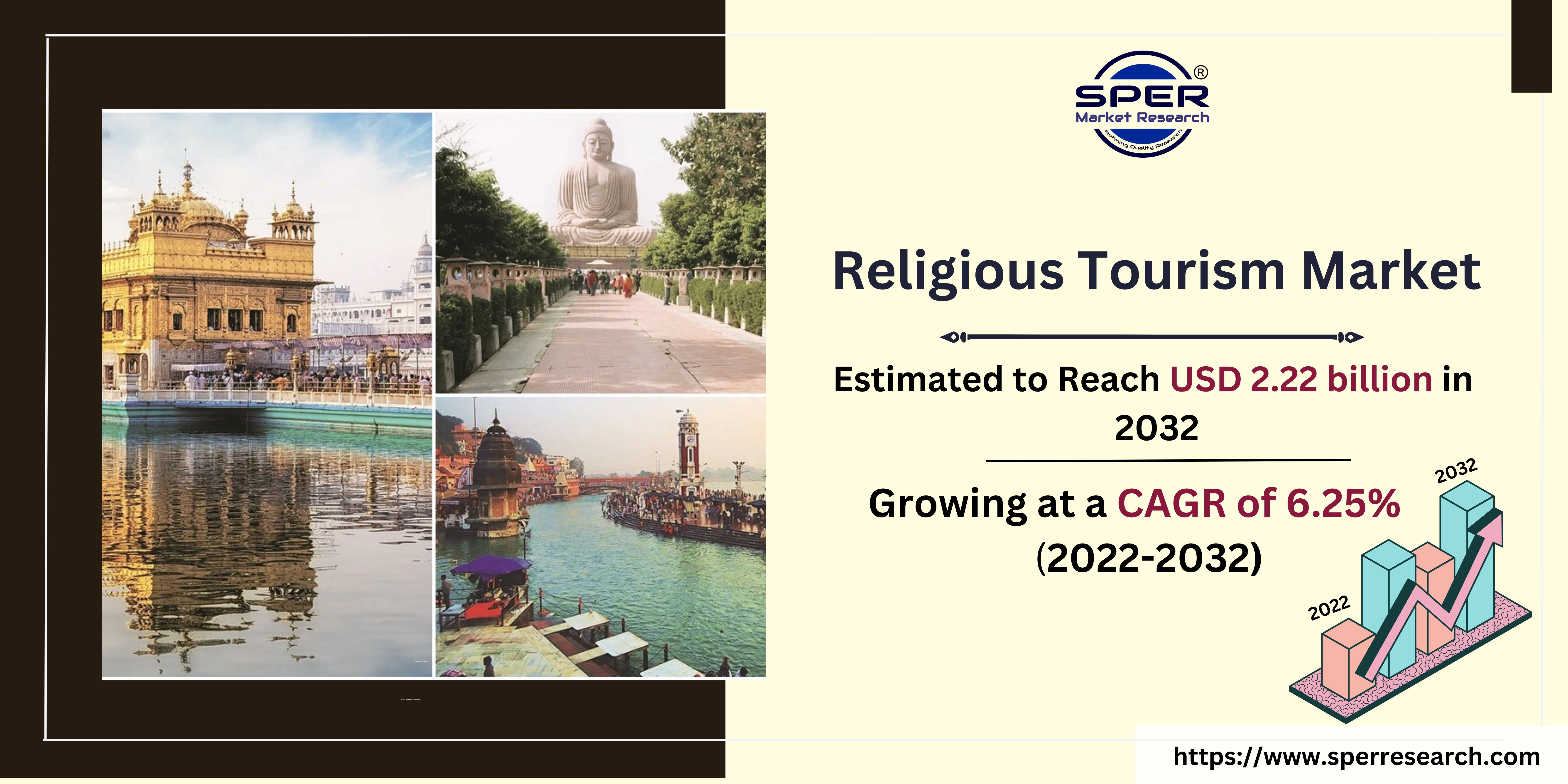
Religious Tourism Market Growth, Share, Size, Trends, Revenue, Competition and Future Outlook
Religious Tourism Market Size- By Type, By Sales Channel, By Religion Type, By Age Group- Regional Outlook, Competitive Strategies and Segment Forecast to 2032
| Published: Apr-2023 | Report ID: TRAT2307 | Pages: 1 - 244 | Formats*: |
| Category : Travel & Tourism | |||


| Report Metric | Details |
| Market size available for years | 2019-2032 |
| Base year considered | 2021 |
| Forecast period | 2022-2032 |
| Segments covered | By Type, By Sales Channel, By Religion Type, By Age Group |
| Regions covered | Asia-Pacific, Europe, Middle East and Africa, North America, Latin America |
| Companies Covered | AAA Travel, Altour, American Express Global Business Travel, BCD Travel, Carlson Wagonlit Travel, China CYTS Tours Holding, China Travel, Corporate Travel Management, Direct Travel, Expedia Group, Fareportal/Travelong, Frosch, HRG North America, JTB Americas Group, Omega World Travel, Ovation Travel Group, Priceline Group, Travel and Transport, Travel Leaders Group, World Travel, Inc. |
- Domestic
- International
- Offline
- Online
- Buddhism
- Catholicism
- Confucianism
- Hinduism
- Islam
- Others
- Below 30 Years
- 30-40 Years
- 40-50 Years
- Above 50 Years
- Asia-Pacific
- Europe
- Middle East & Africa
- North America
- Latin America
- Size of Global Religious Tourism Market (FY’2019-FY’2032)
- Overview of Global Religious Tourism Market
- Segmentation of Global Religious Tourism Market By Type (Domestic, International)
- Segmentation of Global Religious Tourism Market By Sales Channel (Offline, online)
- Segmentation of Global Religious Tourism Market By Religion Type (Buddhism, Catholicism, Confucianism, Hinduism, Islam, Others)
- Segmentation of Global Religious Tourism Market By Age Group (Below 30 Years, 30-40 Years, 40-50 Years, above 50 Years)
- Statistical Snap of Global Religious Tourism Market
- Global Religious Tourism Market Growth Analysis
- Problems and Challenges in Global Religious Tourism Market
- Global Religious Tourism Market Competitive Landscape
- Impact of COVID-19 and Demonetization on Global Religious Tourism Market
- Details on Recent Investment in Global Religious Tourism Market
- Competitive Analysis of Global Religious Tourism Market
- Major Players in the Global Religious Tourism Market
- SWOT Analysis of Global Religious Tourism Market
- Global Religious Tourism Market Future Outlook and Projections (FY’2019-FY’2032)
- Recommendations from Analyst
1.1. Scope of the report1.2. Market segment analysis
2.1 Research data source2.1.1 Secondary data2.1.2 Primary data2.1.3 SPER’s internal database2.1.4 Premium insight from KOL’s2.2 Market size estimation2.2.1 Top-down and Bottom-up approach2.3 Data triangulation
4.1. Driver, Restraint, Opportunity and Challenges analysis4.1.1 Drivers4.1.2 Restraints4.1.3 Opportunities4.1.4 Challenges4.2. COVID-19 Impacts of the Global Religious Tourism Market
5.1. SWOT analysis5.1.1 Strengths5.1.2 Weaknesses5.1.3 Opportunities5.1.4 Threats5.2. PESTEL analysis5.2.1 Political landscape5.2.2 Economic landscape5.2.3 Social landscape5.2.4 Technological landscape5.2.5 Environmental landscape5.2.6 Legal landscape5.3. PORTER’S five forces analysis5.3.1 Bargaining power of suppliers5.3.2 Bargaining power of Buyers5.3.3 Threat of Substitute5.3.4 Threat of new entrant5.3.5 Competitive rivalry5.4. Heat map analysis
6.1 Global Religious Tourism Manufacturing Base Distribution, Sales Area, Product Type6.2 Mergers & Acquisitions, Partnerships, Product Launch, and Collaboration in Global Religious Tourism Market
7.1 Domestic7.2 International
8.1 Offline8.2 Online
9.1 Buddhism9.2 Catholicism9.3 Confucianism9.4 Hinduism9.5 Islam9.6 Others
10.1 Below 30 Years10.2 30-40 Years10.3 40-50 Years10.4 Above 50 Years
11.1 Global Religious Tourism Market and Market Share by Region (2019-2025)11.2 Global Religious Tourism Market and Market Share by Region (2026-2032)11.3 Asia-Pacific11.3.1 Australia11.3.2 China11.3.3 India11.3.4 Japan11.3.5 South Korea11.3.6 Rest of Asia-Pacific11.4 Europe11.4.1 France11.4.2 Germany11.4.3 Italy11.4.4 Spain11.4.5 United Kingdom
11.4.6 Rest of Europe
11.5 Middle East and Africa11.5.1 Kingdom of Saudi Arabia11.5.2 United Arab Emirates11.5.3 Rest of Middle East & Africa11.6 North America11.6.1 Canada11.6.2 Mexico11.6.3 United States11.7 Latin America11.7.1 Argentina11.7.2 Brazil11.7.3 Rest of Latin America
12.1 AAA Travel12.1.1 Company details12.1.2 Financial outlook12.1.3 Product summary12.1.4 Recent developments12.2 Altour12.2.1 Company details12.2.2 Financial outlook12.2.3 Product summary12.2.4 Recent developments12.3 American Express Global Business Travel12.3.1 Company details12.3.2 Financial outlook12.3.3 Product summary12.3.4 Recent developments12.4 BCD Travel12.4.1 Company details12.4.2 Financial outlook12.4.3 Product summary12.4.4 Recent developments12.5 Carlson Wagonlit Travel12.5.1 Company details12.5.2 Financial outlook12.5.3 Product summary12.5.4 Recent developments12.6 China CYTS Tours Holding12.6.1 Company details12.6.2 Financial outlook12.6.3 Product summary12.6.4 Recent developments12.7 China Travel12.7.1 Company details12.7.2 Financial outlook12.7.3 Product summary12.7.4 Recent developments12.8 Corporate Travel Management12.8.1 Company details12.8.2 Financial outlook12.8.3 Product summary12.8.4 Recent developments12.9 Direct Travel12.9.1 Company details12.9.2 Financial outlook12.9.3 Product summary12.9.4 Recent developments12.10 Expedia Group12.10.1 Company details12.10.2 Financial outlook12.10.3 Product summary12.10.4 Recent developments12.11 Fareportal/Travelong12.11.1 Company details12.11.2 Financial outlook12.11.3 Product summary12.11.4 Recent developments12.12 Frosch12.12.1 Company details12.12.2 Financial outlook12.12.3 Product summary12.12.4 Recent developments12.13 HRG North America12.13.1 Company details12.13.2 Financial outlook12.13.3 Product summary12.13.4 Recent developments12.14 JTB Americas Group12.14.1 Company details12.14.2 Financial outlook12.14.3 Product summary12.14.4 Recent developments12.15 Omega World Travel12.15.1 Company details12.15.2 Financial outlook12.15.3 Product summary12.15.4 Recent developments12.16 Ovation Travel Group12.16.1 Company details12.16.2 Financial outlook12.16.3 Product summary12.16.4 Recent developments12.17 Priceline Group12.17.1 Company details12.17.2 Financial outlook12.17.3 Product summary12.17.4 Recent developments12.18 Travel and Transport12.18.1 Company details12.18.2 Financial outlook12.18.3 Product summary12.18.4 Recent developments12.19 Travel Leaders Group12.19.1 Company details12.19.2 Financial outlook12.19.3 Product summary12.19.4 Recent developments12.20 World Travel, Inc.12.20.1 Company details12.20.2 Financial outlook12.20.3 Product summary12.20.4 Recent developments
SPER Market Research’s methodology uses great emphasis on primary research to ensure that the market intelligence insights are up to date, reliable and accurate. Primary interviews are done with players involved in each phase of a supply chain to analyze the market forecasting. The secondary research method is used to help you fully understand how the future markets and the spending patterns look likes.
The report is based on in-depth qualitative and quantitative analysis of the Product Market. The quantitative analysis involves the application of various projection and sampling techniques. The qualitative analysis involves primary interviews, surveys, and vendor briefings. The data gathered as a result of these processes are validated through experts opinion. Our research methodology entails an ideal mixture of primary and secondary initiatives.



Frequently Asked Questions About This Report
PLACE AN ORDER
Year End Discount
Sample Report
Pre-Purchase Inquiry
NEED CUSTOMIZATION?
Request CustomizationCALL OR EMAIL US
100% Secure Payment






Related Reports
Our Global Clients
Our data-driven insights have influenced the strategy of 200+ reputed companies across the globe.






















